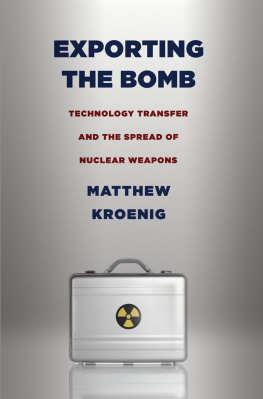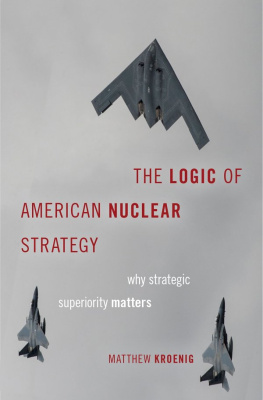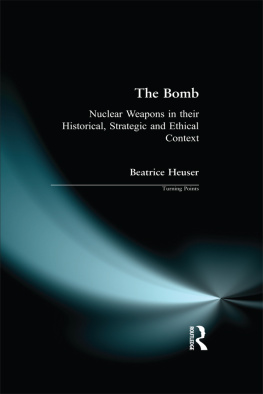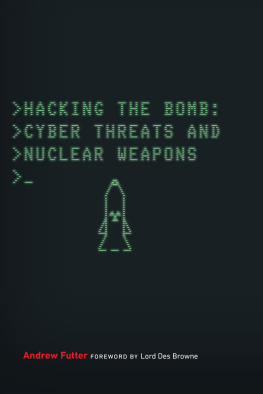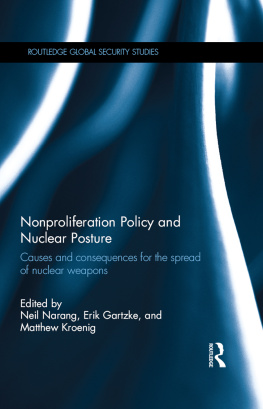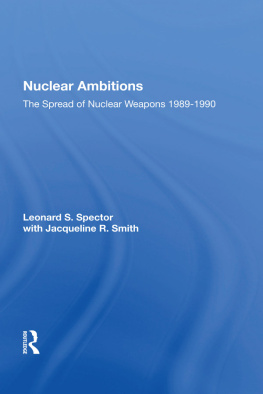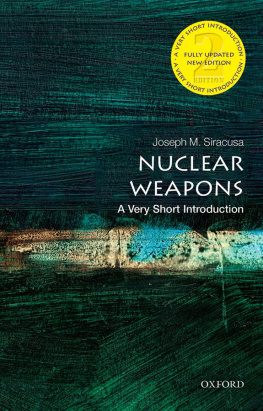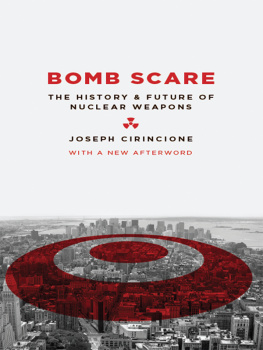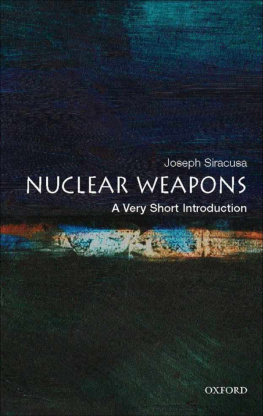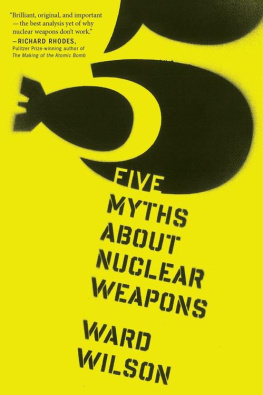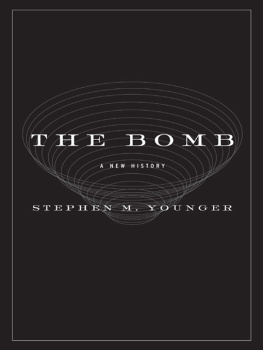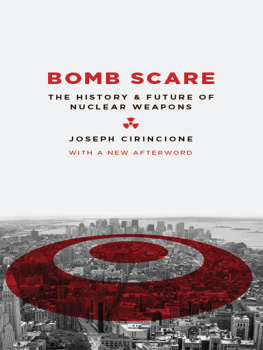Matthew Kroenig - Exporting the Bomb : Technology Transfer and the Spread of Nuclear Weapons
Here you can read online Matthew Kroenig - Exporting the Bomb : Technology Transfer and the Spread of Nuclear Weapons full text of the book (entire story) in english for free. Download pdf and epub, get meaning, cover and reviews about this ebook. publisher: Cornell University Press., genre: Politics. Description of the work, (preface) as well as reviews are available. Best literature library LitArk.com created for fans of good reading and offers a wide selection of genres:
Romance novel
Science fiction
Adventure
Detective
Science
History
Home and family
Prose
Art
Politics
Computer
Non-fiction
Religion
Business
Children
Humor
Choose a favorite category and find really read worthwhile books. Enjoy immersion in the world of imagination, feel the emotions of the characters or learn something new for yourself, make an fascinating discovery.
- Book:Exporting the Bomb : Technology Transfer and the Spread of Nuclear Weapons
- Author:
- Publisher:Cornell University Press.
- Genre:
- Rating:3 / 5
- Favourites:Add to favourites
- Your mark:
- 60
- 1
- 2
- 3
- 4
- 5
Exporting the Bomb : Technology Transfer and the Spread of Nuclear Weapons: summary, description and annotation
We offer to read an annotation, description, summary or preface (depends on what the author of the book "Exporting the Bomb : Technology Transfer and the Spread of Nuclear Weapons" wrote himself). If you haven't found the necessary information about the book — write in the comments, we will try to find it.
Matthew Kroenig: author's other books
Who wrote Exporting the Bomb : Technology Transfer and the Spread of Nuclear Weapons? Find out the surname, the name of the author of the book and a list of all author's works by series.
Exporting the Bomb : Technology Transfer and the Spread of Nuclear Weapons — read online for free the complete book (whole text) full work
Below is the text of the book, divided by pages. System saving the place of the last page read, allows you to conveniently read the book "Exporting the Bomb : Technology Transfer and the Spread of Nuclear Weapons" online for free, without having to search again every time where you left off. Put a bookmark, and you can go to the page where you finished reading at any time.
Font size:
Interval:
Bookmark:
| AEC | Atomic Energy Commission (United States) |
| BOG | Board of Governors (International Atomic Energy Agency) |
| CEA | Commissariat lnergie Atomique (France) |
| CFSD | Central Files State Department |
| CIA | Central Intelligence Agency (United States) |
| FLN | Front de Libration Nationale |
| HEU | highly enriched uranium |
| IAEA | International Atomic Energy Agency |
| IAEC | Israeli Atomic Energy Commission |
| IMF | International Monetary Fund |
| ISI | Inter-Services Intelligence (Pakistan) |
| JFKL | John F. Kennedy Library |
| KRL | Khan Research Laboratories |
| MID | Militarized Interstate Dispute |
| MW | megawatt |
| NARA | National Archives and Records Administration |
| NATO | North Atlantic Treaty Organization |
| NIE | National Intelligence Estimate |
| NPT | Nuclear Nonproliferation Treaty |
| NSC | National Security Council (United States) |
| NSG | Nuclear Suppliers Group |
| NTI | Nuclear Threat Initiative |
| Pinstech | Pakistan Institute of Science and Technology |
| PRC | Peoples Republic of China |
| PSI | Proliferation Security Initiative |
| ReLogit | Rare Events Logistic Regression |
| SGN | Saint-Gobain Techniques Nouvelles |
| SNIE | Special National Intelligence Estimate |
| TRA | Taiwan Relations Act |
| USNA | United States National Archives, College Park, Maryland |
| UN | United Nations |
| UNGA | United Nations General Assembly |
| URENCO | Uranium Enrichment Corporation |
| USSR | United Soviet Socialist Republics |
| WMD | weapons of mass destruction |
This book traces its origins to work I performed as a military analyst in the U.S. government. I was drafting a strategic assessment on how great powers would react to a particular nuclear proliferation issue and was surprised by my own analysis. We often hear that nuclear proliferation poses a general threat to international peace and security and that, for this reason, great powers can work together to combat the threat of nuclear proliferation. Yet, with the issue I was working on, I found great variety in the way countries approached the problem: some countries seemed very threatened by nuclear proliferation and were willing to do almost anything to stop it, others seemed less concerned, and still others were actually helping other countries develop their nuclear weapons programs. I could not understand why countries took such different approaches to what is often thought to be a common problem of nuclear proliferation. More important, I wanted to know why some countries were willing to go so far as to help other countries acquire the deadliest weapons known to mankind. This book is the result of that initial curiosity.
A variety of individuals and institutions played a significant role in the production of this book. I owe a special debt of gratitude to advisors in the Department of Political Science at the University of California at Berkeley. Steve Weber taught me that an argument can be creative, provocative, and correct, all at the same time. I thank M. Steven Fish for his thoughtful guidance on navigating the academy and the wider world beyond it. I thank Giacomo Chiozza for his invaluable advice on measuring and quantitatively analyzing international political events. Michael Nacht provided deep knowledge on nuclear weapons and arms control issues, along with a neverending supply of anecdotes about the policymakers whom I was studying.
An early fellowship with the Institute on Global Conflict and Cooperation (IGCC) at the University of California convinced me that nuclear proliferation was a subject that demanded further scholarly inquiry. I thank Susan Shirk for her work in establishing the Public Policy and Nuclear Threats Program at the IGCC and for saving me from writing on a less important topic.
A research workshop sponsored by the Committee for the Analysis of Military Operations and Strategy helped me to refine my proposal. I thank Stephen Biddle, Elizabeth Kier, and Dan Reiter for their detailed comments on my prospectus.
I spent a year as a fellow at the Center for International Security and Cooperation at Stanford University. I thank Lynn Eden for welcoming me into the vibrant intellectual community that she has helped to create there. I am also deeply indebted to Scott Sagan, whose insights and expertise on the scholarly study of nuclear proliferation assisted me at every stage of this project, all the way from helping me to settle on a question at the beginning of my research to reading and commenting on the entire manuscript upon its completion.
A postdoctoral fellowship in the Managing the Atom Project and the International Security Program at the Belfer Center for Science and International Affairs at Harvard University provided me with the uninterrupted time and supportive environment that helped bring this project to fruition. I thank Steve Miller and Martin Malin for the opportunity to participate in their programs and to take advantage of Harvards many resources.
I am also grateful for comments provided on this research project over the years by Graham Allison, Victor Asal, Naazneen Barma, Kyle Beardsley, Matthew Bunn, Alisa Carrigan, Ashton Carter, Jonathan Caverley, Alex Downes, Brent Durbin, James Fearon, Edward Fogarty, Matthew Fuhrmann, Erik Gartzke, Charles Glaser, Ron Hassner, Siegfried Hecker, John Holdren, Robert Jervis, Peter Katzenstein, Sarah Kreps, Sean Lynn-Jones, Alex Montgomery, Danielle McLaughlin, John Mearsheimer, Jonathan Monten, Patrick Morgan, John Mueller, Tatishe Nteta, Robert Pape, David Patel, Robert Powell, Ely Ratner, Phillip Roessler, Todd Sechser, Jacob Shapiro, Harold Smith, Regine Spector, Paul Stockton, Kevin Wallsten, Christopher Way, Stephen Walt, Dean Wilkening, and Zachary Zwald. My apologies to anyone I forgot.
I have also benefited from generous financial support. I thank the Charles and Louise Travers Department of Political Science at U.C. Berkeley; the Institute of International Studies at U.C. Berkeley; the Institute on Global Conflict and Cooperation at the University of California; the National Science Foundation; the Center for International Security and Cooperation at Stanford University; and the Project on Managing the Atom and the International Security Program at the Belfer Center for Science and International Affairs at Harvard University.
As I was finishing the manuscript, I was also able to benefit from comments at several research seminars across the country. I am grateful for helpful feedback from participants at seminars at the Olin Institute for Strategic Studies at Harvard University, the Program on International Security Policy at the University of Chicago, and the Center for International and Security Studies at the University of Maryland.
Parts of this book previously appeared in academic journal articles. I thank Cambridge University Press and Sage Publications for the permission to reprint this material.
For helping this book through the publication process, I am grateful to Roger Haydon, the editors of the Cornell Studies in Security Affairs Series, and the staff at Cornell University Press. I also thank two anonymous reviewers for their constructive comments.
Font size:
Interval:
Bookmark:
Similar books «Exporting the Bomb : Technology Transfer and the Spread of Nuclear Weapons»
Look at similar books to Exporting the Bomb : Technology Transfer and the Spread of Nuclear Weapons. We have selected literature similar in name and meaning in the hope of providing readers with more options to find new, interesting, not yet read works.
Discussion, reviews of the book Exporting the Bomb : Technology Transfer and the Spread of Nuclear Weapons and just readers' own opinions. Leave your comments, write what you think about the work, its meaning or the main characters. Specify what exactly you liked and what you didn't like, and why you think so.

